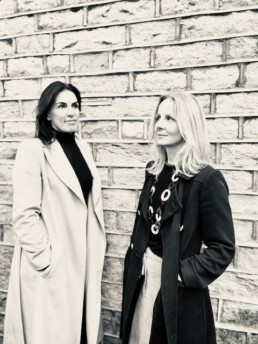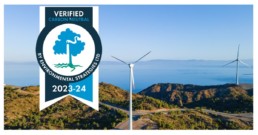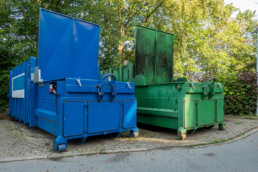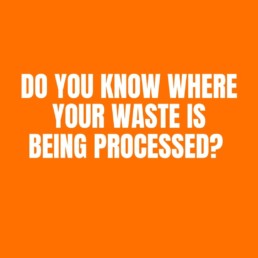Footprint Recycling completes the prestigious Goldman Sachs 10KSB Programme
Footprint Recycling is delighted to announce its completion of the prestigious Goldman Sachs 10,000 Small Businesses UK Programme.
The programme, in conjunction with Oxford Said and Aston Business Schools and a team of cohort facilitators, including growth experts, is designed to empower business entrepreneurs with practical skills, tools, and resources to grow and create jobs within their communities.
Footprint enrolled in the programme last summer and, along with 71 other business owners, was selected to join the February 2024 cohort.
Run over 14 weeks, the programme offers an in-depth curriculum of tutoring and mentorship covering:
Business Education
- Financial management, marketing, and operations.
- Practical, hands-on learning experiences and networking opportunities.
Support Services:
- Tailored business advising and coaching from experienced professionals.
- Access to a network of support services, including legal, financial, and marketing advice.
- Ongoing alumni services for continued growth.
Access to Capital:
- Guidance on navigating the financing landscape and connecting with lenders and investors.
- Education on presenting businesses to financial institutions.
Clare Verity, COO and Co-founder, commented, “We were thrilled to be selected for the programme. We have ambitious growth plans for the future, so the opportunity came at the right time.
We had heard great things about how it helped businesses (up to £10m) successfully scale the next growth phase. The course is highly intensive and requires a lot of focused attention, so Robyn Brook, Co-founder and CEO, took a step back from the day-to-day business to participate.
There are always opportunities to learn from, no matter how long or established we are as a business. It would be naive of us not to constantly strive to develop and build on our existing skill set as business owners. Ultimately, participating in the Goldman Sachs 10KSB Programme is not only beneficial for us but also for our customers and the ongoing value we create for them. “
Hear what Robyn Brook, CEO and Co-founder has to say about the 10KSB Program, its insights, and how it has helped to shape the business.



We are officially carbon neutral!
We're thrilled to announce that we have officially become carbon neutral
Over the past few months, we have collaborated on a comprehensive plan to measure, reduce, and offset our collective carbon footprint.
At Footprint Recycling, our commitment to the environment has always been at the forefront of our actions as individuals and as a business. Whilst we have always worked towards keeping our emissions low, with our new carbon-neutral status (scope 1 & 2), we are now actively supporting carbon-reducing projects and have conducted a thorough analysis of our emissions.
By calculating our carbon output, we have reduced our emissions by implementing various measures in our business. These include switching to electric cars, reducing and recycling, and evaluating our energy consumption and efficiency.
We have successfully offset our emissions by supporting a certified project in Malawi, which is verified by the world's leading carbon offset standards, VCS and Gold Standard. This ensures projects have minimal permanence risks and incur positive social, economic and environmental impacts where relevant. This project also aligns with the UN Sustainable Development Goals of:
- No poverty
- Decent work and economic growth
- Responsible consumption and production
- Climate action.
Our chosen project, cleaner cookstoves, replaces traditional cooking equipment, which typically consists of open flame fed by wood has many benefits by providing more efficient cooking equipment. Cleaner cookstoves typically:
- Reduce the energy consumption for cooking, reducing carbon emissions
- Reduce the consumption of firewood/cooking fuel
- Saves time due to less time spent collecting fuel, more efficient and quicker cooking process
- Reduces deforestation
- Has the potential to save families valuable household income
- Provides improved indoor health - less exposure to smoke and improved indoor air quality.
Our vision is to achieve net-zero emissions and go beyond carbon neutrality. This ambitious goal will require us to make significant and lasting changes to our procurement and supply chain, and we are excited about the journey ahead.
If you need support or advice about carbon neutrality and reducing carbon emissions. Get in touch.
Starting from 6th April 2024, new regulations will be introduced in Wales that will require all non-domestic premises, such as businesses, charities, public sectors, and those who collect, keep, treat, or transport waste from non-domestic premises, to separate key recyclable materials.
Non-domestic premises must separate and present nine specified recyclable waste materials in a minimum of six separate recyclable waste streams. These materials are:
- glass
- cartons and similar, metal and plastic
- paper and card
- food waste from premises that produce 5 kilograms or more of food waste in seven consecutive days
- unsold small waste electrical and electronic equipment
- unsold textiles
Bans will also be in place from 6th April 2024, on the disposal of food waste to sewer from non-domestic premises, specified separate recyclable waste streams going to incineration plants and landfills, and all wood waste going to landfill.
These changes to the law aim to help the country work towards becoming a zero-waste nation and reducing carbon emissions by 2050. Separating and sorting recycling in workplaces should ensure greater volumes of high-quality recycling are produced and much less waste sent to landfill and for incineration.
Failure to comply with the separation requirements will be considered an offence, and there will be no upper limit on the courts' power to fine. Instead of criminal prosecution, a civil sanction may be issued for non-compliance with the separation requirements.
While we have a legal responsibility under the Environmental Protection Act 1990 'duty of care', should England adopt these more stringent regulations regarding separation of recyclable waste in order to achieve a greener future and promote sustainability? Many organisations in England currently do not have a waste strategy in place and do not separate recyclable waste from non-recyclable. However, commercial recycling plays a crucial role in ensuring sustainability. It is important for businesses to actively participate in these efforts.
For more detailed information about the Waste Separation Requirements (Wales) Regulations 2023, please refer to the Welsh Government code of practice. If you're a business and are looking to adopt a waste and recycling strategy get in touch.
International Women’s Day - Invest in Women: Accelerate Progress
Robyn Brook and Clare Verity are the founders of Footprint Recycling. Here, they share their experience as women in waste and the critical role women play in the industry.
Clare:
“Prior to establishing Footprint Recycling, I was employed in the waste management sector, where I found my job to be personally fulfilling and environmentally rewarding. During my pregnancy with my second child, I was motivated to utilise my expertise and passion for the industry to start my own business. That’s when my business partner, Robyn, and I founded Footprint Recycling 16 years ago.
“As a female-owned business in a male-dominated industry, we understand the importance of supporting and empowering our younger colleagues as they develop their careers. This year’s International Women’s Day theme, “Invest in Women: Accelerate Progress,” serves as a reminder to provide equal opportunities for education, training, and professional development to women in waste. Through our efforts, we aim to promote gender equality and help women achieve their full potential in the industry and make positive changes.”
Robyn:
“Over the years, it’s been great to see more women join the waste and recycling industry and I am proud of the fact that Footprint was founded by women and women make up many of the key roles within our organisation. It’s a testament to the progress made since we began our journey. International Women’s Day is an excellent opportunity to acknowledge and celebrate this, and the valuable contributions women are making across all areas of the waste industry.
“At Footprint, one of our core values is ‘respect’. We live by this. It is the bedrock of everything we do, and we feel strongly that celebrating gender diversity is important. It fosters a more inclusive workplace and brings a variety of perspectives and experiences to the table, promoting better problem-solving, decision-making, and, ultimately, success for our business.
“I am inspired by our team and of what Clare and I have accomplished for women and diversity in waste.”
Women’s roles are essential to our industry’s success, especially with the growing shift towards viewing waste as a resource. The industry is moving away from traditional landfill practices and towards waste prevention and a circular economy. Women have seen the industry’s huge potential, and through their assertiveness and progressive attitude, women can help shape the industry’s future towards a more efficient and sustainable future.
If you’d like to work with Footprint Recycling, get in touch for an informal chat.
Responding to the needs of our customers
We recently had a conversation with one of our customers and gained valuable insights about the benefits of working with Footprint Recycling. It was such an inspiring story we shared it across our channels and we received a comment about the importance of reviewing where the waste was being processed and ensuring it was being processed effectively. This is absolutely right.
All businesses need to consider where their waste is processed as part of their waste journey as when it comes to reducing waste and promoting sustainability, businesses have a significant role to play.
At Footprint, we believe that a comprehensive waste journey analysis is the first step towards achieving this goal. We work closely with our customers to assess their waste production and identify areas where they can reduce, recycle, reuse, and repurpose waste.
We then assist them in implementing these changes while ensuring that they comply with all legal requirements. We understand that monitoring and reporting are critical components of any waste management process. That's why we provide our customers with regular updates on their waste journey process, including data on waste generation, recycling rates, disposal methods and outcomes. This information helps them to evaluate their progress and identify areas for further improvement.
We believe that a zero-waste approach is the way forward, and we encourage our customers to adopt this mindset. By eliminating waste from their production processes and finding innovative ways to repurpose and reuse materials, businesses can significantly reduce their environmental impact while saving money.
In conclusion, our comprehensive waste reduction process is designed to guide businesses towards sustainability and zero-waste practices. We believe that by working together, we can make a real difference and build a better future for generations to come.
Job opportunity - Commercial Sales Manager
We're a waste management and recycling business is dedicated to providing top-notch services that prioritise sustainability, carbon reduction, and recycling. We understand the importance of reducing waste and protecting the environment, so we work tirelessly to ensure our clients receive the best possible solutions. Our team is committed to delivering exceptional care and quality, and we take pride in being a reliable partner for businesses looking to make a positive impact on the planet. Together, we can create a cleaner, healthier future for all. If you're interested in joining our team, read on.
COMMERCIAL SALES MANAGER ROLE
We’re excited to announce a newly created Commercial Sales Manager job role. Working for Footprint Recycling, a national waste management and environmental consultancy business, you will be responsible for seeking out and developing new business and building relationships.
We require an experienced manager to take charge of sales performance and growth, focussing on new business and profitability through securing new key accounts by building a sales pipeline and growing and developing the sales team in the waste management brokerage industry.
As the Commercial Sales Manager, you will report directly to the Board of Directors, detailing sales performance, collaborating on sales forecasting and playing a pivotal role in achieving strategic goals.
You will be the driving force behind achieving financial targets and leading a team to success.
Experience:
- Proven track record in new business development, identifying strategy, building your pipeline and delivering new business opportunities
- Experience in building, recruiting and managing a sales team
- Provide strong leadership and management skills supporting, mentoring and motivating the sales team to deliver against their set targets
- Demonstrate strong sales techniques, including selling, presentation, closing ability, customer relationship building and contract negotiation skills
- Have experience developing new sales and marketing campaigns using various media
- Building key relationships with both customers and suppliers at all levels
- Working closely with operations to ensure quality of service and account retention
- Have waste management and, ideally brokerage experience.
Skills:
- Be articulate and confident
- Analytical and able to quickly assess issues and recommend and/or implement solutions
- Robust and resilient, able to absorb pressure and respond positively
- Solid pragmatic approach to delivering to tight deadlines and targets
- Ability to plan, organise and prioritise
- Hold a full UK driving licence.
Ideally, The candidate will be based in and around Yorkshire or Lancashire. The role will require travel and time spent in the office in Huddersfield.
Package: £48-50k + OTE + car allowance
To apply please send a covering lettering and your CV to Robyn@footprint-recycling.com
We’re proud to announce that Footprint Recycling are ISO 9001:2015 and ISO 14001:2105 certified.
We now hold ISO 9001:2015 and ISO 14001:2015 accreditations. To achieve these globally recognised awards, we have evidenced our quality management systems, as well as the high level of quality customer service that we provide, while having a strong focus on sustainable development initiatives.
We worked towards our ISO accreditation to demonstrate our promise to provide high-quality, trusted services to our customers and our ongoing commitment to developing our ethical management systems.
To become ISO compliant, we underwent a long and extensive evaluation process that included an in-depth assessment of our quality management systems, a management system documentation review, and an audit of our processes and compliance, which was successful.
So, what are ISO certifications and why are they important?
ISO certifications are a seal of approval from the International Organization for Standardization (ISO) body that acknowledges a company is run to one of their developed and published international standards. The ISO are an independent, non-governmental international organisation that brings together experts to share knowledge and develop standards that support innovation and provide solutions to global challenges.
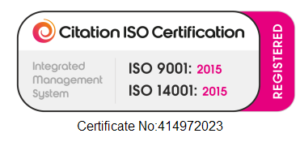
What is ISO 9001:2015?
ISO 9001:2015 is the internationally recognised Standard for Quality Management and is used by over 1 million companies; it was created to give organisations such as ours an internationally recognised award that proves we’re dedicated to reducing costs and improving productivity.
ISO 9001:2015 certification also assures our customers that they will receive consistent, quality products and services.
How ISO 9001:2015 help us?
ISO 9001 helps us improve quality and demonstrates to our clients that we have a strict set of standards in place, including customer focus, leadership, engagement of people, process approach, continual improvement, evidence-based decision-making, and relationship management.
What are the benefits of ISO 9001?
Benefits of ISO 9001 Certification include – increased efficiency, international recognition, a factual approach to decision-making, better supplier relationships, improved customer satisfaction, and excellent employee morale.
What is ISO 14001:2015?
ISO 14001:2015 is the International Standard for Environmental Management Systems (EMS). Designed to help businesses and other organisations to reduce their environmental impact.
Implementing ISO 14001:2015 helps us to demonstrate to our customers and stakeholders that we are committed to reducing our environmental impact (in addition to helping our customers reduce theirs). In addition, it demonstrates our pledge to reduce waste and improve our resource efficiency.
Our ISO certifications demonstrate that we have robust, clearly defined procedures in all our business areas, such as risk management, handling of documents and data, environmental awareness, and strong business continuity processes.
We believe our ISO accreditations are important as they demonstrate the quality of service provided. Investing in a new product or service, often from a company you have not previously worked with, can be unnerving. The ISO certificate is a testimony of trust that demonstrates our commitment to you.
Now that we’re officially ISO accredited, we can proudly state that Footprint Recycling (continues and officially) operates with both quality and transparency in everything we do.
Get in touch if you need help or support with any waste management and emissions.
Clinical Waste Regulations
Clinical waste can be hazardous or harmful and cannot be disposed of in regular waste receptacles, general waste bins, skips or recyclate bins. It is commonly produced in hospitals, labs, and clinics but can also be produced in other types of businesses or homes. It could be anything from human or animal tissue, to drugs or medicines, pharmaceutical products, needles or syringes (and other sharp objects), swabs or dressings.
All businesses have a legal responsibility to dispose of clinical waste safely, and it is part of the statutory duty of employers under the Health and Safety at Work Act (HSWA), Control of Substances Hazardous to Health (COSHH) and Hazardous Waste regulations made under the Environmental Protection Act.
The safe disposal of clinical waste must be managed in line with several other regulations which relate to the storage, collection and disposal of clinical waste. An extensive, but though exhaustive, list of the legislation and regulations includes:
- Controlled Waste Regulations 2012
- The Waste (England and Wales) Regulations 2011
- Hazardous Waste Directive 2011
- Carriage Of Dangerous Goods Regulations 2009
- Hazardous Waste Regulations 2005
- List of Wastes Regulations 2005
- Environmental Protection (Duty of Care) Regulations 2003
- COSHH Regulations 2002
- The Environmental Protection Act 1990
Breach of the regulations by an employer or employee is a crime, punishable by summary conviction or on indictment by an unlimited fine.
So what is clinical waste?
Clinical waste can pose a risk of infection when handled. There are many different types of clinical waste, each requiring special care in its disposal. Understanding clinical waste can help you dispose of it correctly and prevent contamination, the main categories for clinical waste are:
- Infectious waste containing pathogens
- Pharmaceutical waste
- Pathological waste containing human tissue or fluid
- Chemical waste
- Sharp wastes
- Radioactive waste
- Pressurised containers
- High heavy metal content
Understanding the importance of proper clinical waste management is essential for any business with the above waste. We offer professional services that ensure complete compliance with UK regulations, whether it’s advice, collection, treatment, or disposal, we’re here to help you at every step. We can take care of all the paperwork related to our collections, which means you can have the documentation you need to prove your compliance with UK waste regulations.
Contact us today for a free, no-obligation quote on our expert waste management services. We’re always happy to help!
World Oceans Day 2023
Today is World Oceans Day, a day to reflect on the ocean's vital role. The ocean is home to countless plants and animals, from tiny single-celled organisms to the majestic blue whale.
Marine plants provide us with approximately 50-70% of the oxygen we breathe, while the ocean also 30% of the carbon dioxide produced by humans, helping to mitigate the effects of global warming.
The ocean also plays a crucial role in regulating our climate, providing warmth in the winter and cool breezes in the summer. Additionally, it provides us with food, medicines, and transportation. However, there are pressing issues that threaten the health of our oceans. Plastic pollution, particularly single-use items like bags and bottles, is a significant concern that has been the focus of World Oceans Day campaigns for several years.
Climate change and rising sea temperatures are also serious problems, as they directly affect weather patterns and put marine organisms at risk. The increasing acidity of seawater due to rising carbon dioxide levels is yet another challenge we must address. Let us take this day to reflect on the importance of our oceans and commit to protecting them.
As a business, how can we take a stand and support our oceans' ecosystem? If you know of any pioneering businesses in this area, please comment below! We'd love to hear about them.
As a business how can we support World Earth Day?
World Earth Day is an annual event celebrated on April 22nd to raise awareness and encourage action to protect the environment. It is a day to remind us of the importance of sustainable living and how we can make a difference in the world.
Businesses play a crucial role in the fight against climate change and can support World Earth Day in several ways.
Firstly, businesses can promote sustainable practices within their operations. For example, they can adopt environmentally friendly policies such as reducing waste, using renewable energy sources, and conserving water. They can also encourage employees to reduce their carbon footprint by using public transport or cycling to work. By taking such steps, businesses can reduce their environmental impact and help mitigate climate change.
Secondly, businesses can partner with environmental organisations to support their activities. For example, they can sponsor tree planting or countryside/beach clean-up activities. They can also donate to organizations that work to protect the environment or support research on climate change. Such partnerships can raise awareness of the environmental challenges facing our planet and encourage individuals to take action.
Thirdly, businesses can use World Earth Day to launch or promote sustainable products and services. They can showcase how their products are eco-friendly and sustainable and how they are contributing to the fight against climate change. This can be an excellent way for businesses to increase their brand visibility and promote their commitment to environmental sustainability.
Fourthly, businesses can organize events or campaigns that promote environmental sustainability. For example, they can organise a cycling or walking event to promote low-carbon transport. They can also organise educational campaigns that raise awareness of the importance of reducing waste or conserving energy. Such initiatives can help to mobilize people to take action and create a positive impact on the environment.
Lastly, businesses can support World Earth Day by promoting environmental sustainability in their supply chains. They can work with their suppliers to ensure they are also committed to sustainable practices. They can also encourage their customers to adopt eco-friendly practices and promote their sustainable products.
To conclude, businesses can play a vital role in supporting World Earth Day by adopting sustainable practices, partnering with environmental organizations, promoting sustainable products and services, organizing events and campaigns, and promoting environmental sustainability in their supply chains. By doing so, businesses can positively impact the environment and contribute to the fight against climate change. Ultimately, protecting our planet is a shared responsibility, and everyone, including businesses, must take action to ensure a sustainable future for generations to come.
We're just scratching the surface here, but If you're ready to move to become more sustainable, get in touch, and we'll be happy to review your waste management processes and carbon emissions.

